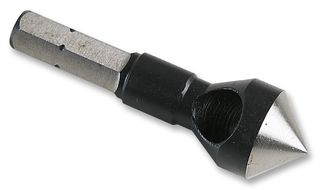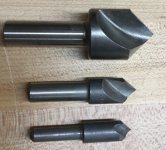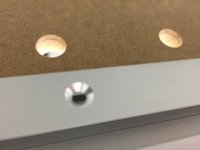You are using an out of date browser. It may not display this or other websites correctly.
You should upgrade or use an alternative browser.
You should upgrade or use an alternative browser.
Countersink use on aluminum?
- Thread starter gsdvorak
- Start date
AlexThePalex
Member
- Joined
- Nov 12, 2008
- Messages
- 7,808
Yes, I have used it on aluminium, it worked fine. Good hole and no damage to the bit. Aluminium is pretty soft.
Would only use it for the occasional hole though. Not for doing it all day.
Would only use it for the occasional hole though. Not for doing it all day.
Cheese
Member
I've used mine on aluminum from time to time...just go easy.
As Alex suggested, it can be used on an occasional basis.
If you need to do a lot of counter sinks or really need to hog out some aluminum, purchase some of these. I think they're actually cheaper than the Festool version. They're manufactured by Ford the toolmaker, not the automobile company.
As Alex suggested, it can be used on an occasional basis.
If you need to do a lot of counter sinks or really need to hog out some aluminum, purchase some of these. I think they're actually cheaper than the Festool version. They're manufactured by Ford the toolmaker, not the automobile company.
Attachments
rvieceli
Member
[member=44099]Cheese[/member] are those M A Ford uniflutes? I like mine [big grin]
Cheese
Member
Ya Ron they are. These are over 30 years old and have been sharpened once or twice. I tried using MA Ford's multiple flute version and I always got chatter marks no matter what the speed. So the unflute version is my go-to countersink for aluminum, steel & stainless. Although for stainless I use their TiN coated version.
It is called zero flute countersink and they work on metal just fine, probably better than most. It'll cut a single spiral shaving if sharp and used at right speed and feed. If you are worried about your Festool centrotec get one designed for metals from Magafor.
Cheese said:I think they're actually cheaper than the Festool version.
Yes, they were... 30 years ago. [big grin]
Cheese
Member
Svar said:Cheese said:I think they're actually cheaper than the Festool version.
Yes, they were... 30 years ago. [big grin]
I was actually referring to present day pricing...but you're statement is still hilarious. [not worthy]
Cheese
Member
rvieceli
Member
cheese - M A ford says that zero flute is even ok for hardened steel (35 - 65 Rc)
I use my uniflutes on hardwood as well. Mostly walnut, maple and oak.
I use my uniflutes on hardwood as well. Mostly walnut, maple and oak.
Cheese
Member
Thanks [member=3192]rvieceli[/member]
That's real good to know. I'll order one and try it out.
I really like the zero flute Festool on wood because you can slice a little or slice a lot and its all very controllable. I've always used the Ford's on wood and was happy until I picked up the 2 Festool zero flutes. I now only use the Festools on wood and the occasional aluminium (heh heh) item.
That's real good to know. I'll order one and try it out.
I really like the zero flute Festool on wood because you can slice a little or slice a lot and its all very controllable. I've always used the Ford's on wood and was happy until I picked up the 2 Festool zero flutes. I now only use the Festools on wood and the occasional aluminium (heh heh) item.
demographic
Member
- Joined
- May 9, 2015
- Messages
- 806
Cheese said:Well I just visited the MA Ford website and look what I found.
I do know that KEO also makes their own version. Has anyone tried one of these on a hard material? I'd think they'd be for soft materials only.
I've been using ones like that but made by Hall for a number of years.
Think they are actually for deburring steel but they seem to last well and fit into a standard 1/4 bit holder or a drill chuck.

rvieceli
Member
[member=44099]Cheese[/member] what are you getting in the zero flute?
I do aluminum glazing fabricating and exclusively use the Weldon style countersinks which is the style that Demographic posted. You can buy them from any metal fabrication distributor...MSC, McMaster Carr, Fastenal, Grainger et al. They come in various sizes and are available in 90 and 60 degree. They do not dull quickly, but after a a couple thousand holes, I roll a sheet of silicon carbide 400 grit put it through the hole and rotate. They also work well in brass and copper and are available with an appropriate sized centering shaft.
Cheese
Member
rvieceli said:[member=44099]Cheese[/member] what are you getting in the zero flute?
[member=3192]rvieceli[/member]
I'm looking at the 82 degree C'sk with either a 1/4" or 1/2" shaft diameter, haven't decided yet.
My only thought on the issue is the difference between countersinking in steel and deburring in steel. My gut feel is that it may be better to countersink with the uniflute design, while it may be a lot cleaner to deburr with the zero flute design.
We'll find out...
Similar threads
- Replies
- 0
- Views
- 124
- Replies
- 3
- Views
- 881



